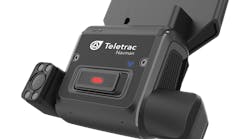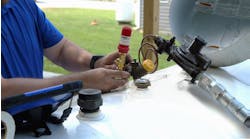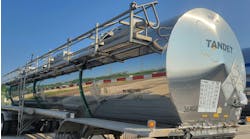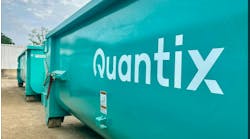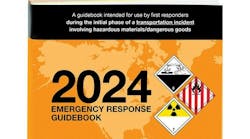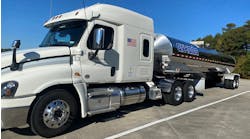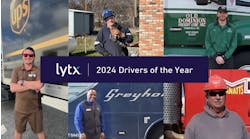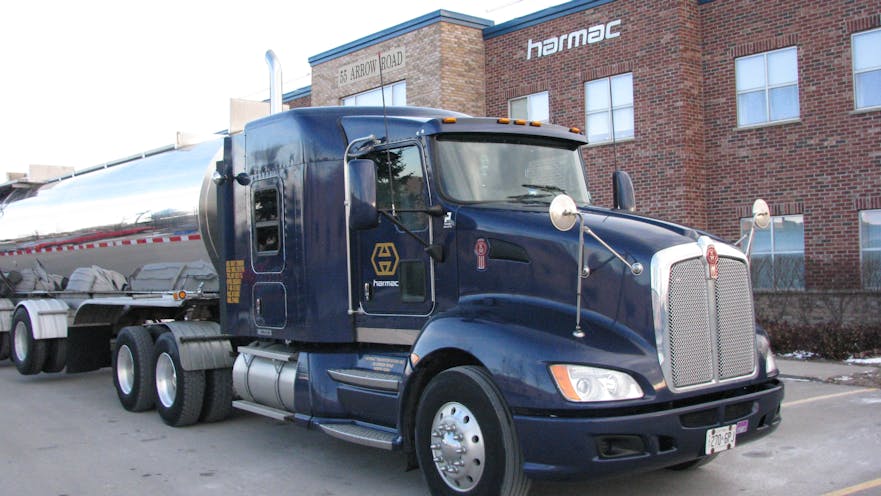For roughly four decades, Harmac Transportation’s leadership has worked hard to build an outstanding safety program. That effort was recognized earlier this year when the North York, Ontario, Canada-based chemical hauler was presented with the National Tank Truck Carriers Outstanding Safety Performance Trophy in the Sutherland Division for carriers running less than 15 million miles annually.
Harmac earned the trophy—its first—in the 2022 North American Safety Contest with an accident frequency of just .089 per million miles. The carrier also received the Grand Award in Class 7.
“I want to thank NTTC and Heil Trailer for creating this award and the competition to be the best in safety that it has generated from all of the great carriers out there in North America in the bulk business,” said Mark Shannon, president of Seaboard Group. “Winning this award is the pinnacle of safety achievement. It’s a big trophy. It really does look like the (National Hockey League’s) Stanley Cup.
“It is quite a milestone. We can’t thank NTTC and Heil enough for creating this award program. It’s certainly a competition. We’ve always wanted to be better than the other carriers in safety. We always wanted to win this award, which we see as the pinnacle of safety achievement. It’s recognition that we were on the right course. Any carrier that wins the Heil Trophy should be proud of their achievement.
“We’re extremely proud of this achievement, and we’ve been promoting this award throughout our organization. It’s a great story. It’s great for all our employees, and our drivers and owner-operators. Other drivers across our group are asking if there are other opportunities where they could work toward similar awards.
“We have earned other awards this year throughout our group. Seaboard was named Shell Carrier of the Year for petroleum distribution in Canada. Seaboard Group was also named a Best Managed Carrier through the Best Managed Company program.”
Seaboard Group
Established in 1983, Harmac is part of the Seaboard Transport Group, which is based in Dartmouth, Nova Scotia, Canada. Seaboard is the parent company for the various companies started or acquired over the past 60 years. Harmac is an over-the-road bulk chemical transporter based out of terminals in Toronto and Sarnia. It was acquired by Seaboard in 1998.
“Seaboard’s roots were in the petroleum hauling business that was started by Joe Shannon, my father, with one truck and tank trailer in 1964,” Shannon said. “He delivered to service stations on Cape Breton Island in Nova Scotia.”
Besides Harmac, the group portfolio includes a number of tank truck operations: A J Weigand (chemical hauler based in Ohio), G3 Transport (various bulk commodities), G.A. Foss (petroleum), Seaboard Transport (petroleum and diversified commodities), Mantei’s Transport (petroleum), and Wiebe Transport (petroleum). Seaboard also operates rail-to-truck transload facilities located in Grande Prairie, Alberta, and Woodstock, Ontario, under the Seaboard Bulk Terminals brand.
“We’re still looking for acquisitions, as the market continues to consolidate,” Shannon said.
Magazine story
“A story in Bulk Transporter was the catalyst that led us to purchase the company,” Shannon said. “My father and I were looking for good companies to purchase to expand our business into central Canada, and we came across that Bulk Transporter article. On reading the article, we realized we had found a great tank truck carrier. Gord Pryce owned it. We went to visit their location in Concord, Ontario, and ended up buying the company.
“Harmac was a member of NTTC when we bought it; certainly since 1998. Prior to that we were primarily a Canadian carrier. Expansion into the United States was a critical milestone for us in our business. With the purchase of Harmac, we not only added operations in Ontario, but we moved into the larger North American market. And we’ve continued to grow since then.”
Harmac is the only one of the Seaboard Group fleet operations that runs throughout the North American market. However, another chemical fleet subsidiary—A J Weigand—is based in Ohio in the United States.
At the time of the acquisition, Harmac had the distinction of being the first road transportation member to obtain Responsible Care verification from the Chemistry Industry Association of Canada. Harmac’s certification in the program is a testament to the care and effort dedicated to operating in a safe, reliable, and professional manner.
“Harmac had built a solid core of chemical shippers, and we’ve continued the process,” Shannon said. “A benefit of these long-tenured customers is that we have a good sense of where the loads are going, and our drivers know their routes.
“Over the years, we’ve seen a lot of changes in the chemical world, and many of the Canadian chemical companies have changed hands or their corporate offices moved back to the United States, but we’re still serving their operations.”
A range of chemical loads include some plastic pellets and other dry commodities. Operations include a lot of cross-border shipments to the Chicago, Illinois area; Texas; the Northeast and Southeast United States; and some to the Western United States. Harmac also provides intra-Canada service.
Trips typically run 150 miles and greater with a lot of longer hauls. Most trips range from three days to a week. “We go wherever our customers want us to go in North America,” Shannon said.
To serve those customers, Harmac runs a fleet that fluctuates between 130 and 150 tractors. A variety of tank trailers are used, including b-train, quad- and tri-axle tanks in Canada, and tandem-axle tanks in the United States. Fall protection is spec’d as standard safety equipment on all trailers.
“Anything you can use to prevent potential injury to your employees or contractors is critical,” Shannon said. “Fall protection is in place at most of the locations where our drivers load and unload.”
Great acquisition
“Harmac has been a great acquisition for us,” Shannon said. “A lot of the drivers who were there in 1998 are still with us, and they are great drivers. We wouldn’t have won this award if it weren’t for our great company drivers and owner-operators.”
The Heil trophy was always an objective in the company’s safety program. “When I went to my first NTTC Annual Conference after we bought Harmac—it was probably 1999—I saw all of these awards being given out,” Shannon said. “We’ve been to many of those conferences since then and we’ve always said we wanted to be on the stage with that trophy. Our numbers were always good enough to get us our safety award in our mileage category. We have lots of safety plaques on the wall from NTTC, but that trophy was always in our sights.
“We knew that winning that award would be quite an accomplishment for our company drivers, our owner-operators, our staff, and certainly my father who started our business. At 83 years old, he’s still involved as chief executive officer for our group of companies. He was thrilled to death to win that award because he knows how much it means to the tank truck industry.”
Safety culture
Shannon stressed that winning an award like the Outstanding Safety Performance Trophy isn’t something that happens overnight. “For us, it started with our safety culture that is based on operations that are safe, reliable, and professional,” he said. “Those are our core values, and we instill them in all the companies that make up the Seaboard Transport Group. Those values have been in place throughout the nearly 60 years Seaboard Transport Group has been in business. We’ll be celebrating our 60th anniversary next year.”
Those values are very much in place at Harmac, and all the Harmac people live by those values. A clear and consistent safety message is communicated from the Seaboard Group safety department led by Brad Petin. Safety coordinators are deployed in the field across the operation. The company also employs many driver trainers.
With diverse fleet operation spread across Canada, Harmac and the other fleet subsidiaries are always looking for skilled professional truck drivers. The chemical hauler prefers a 50/50 balance of company drivers and owner-operators. The carrier wants two streams to ensure adequate availability.
“I think there is no doubt that we will use the Heil Trophy as part of our effort to attract more drivers,” Shannon said. “We believe it certainly should help attract more of the right drivers to our company.
Mixed bag
Canada’s driver market is a mixed bag right now, according to Shannon. “On the one hand, we see more experienced tanker driver availability right now with the economy slowing down. We have a quality brand name in the industry, and we are able to attract more of the experienced drivers. Also, there is a lot of immigration happening right now, and we are able to draw from that pool as well.
“On the other hand, even in a slightly slower economy this year in Canada, we still find it difficult to hire enough drivers. The pool isn’t getting any bigger. Still, we are hiring, and we are still growing, just at a slower rate.
“We want experienced drivers, and we look for those with bulk experience, preferably at least two years of bulk experience. We do hire van drivers and we put them through an eight-week tank training course. They work with a trainer who has tank experience. Drivers with tank experience go through a three-week orientation to learn our procedures and way of operating.
“It’s not just knowing how to drive a truck. They need to understand the types of customers we are serving and their requirements for loading and unloading cargoes. A lot of details go into safely operating a tank truck. Drivers are a critical factor in the supply chain when it comes to handling dangerous cargoes.”
Tech role
Drivers who are new to Harmac learn quickly that technology plays a critical role in the carrier’s effort to be the safest tank truck fleet in the industry. A key component to over-the-road safety is the Seaboard Group’s driver performance scorecard.
“We were early adopters of elogs back in 2009.” Shannon said. “We introduced the scorecard to our entire Group—including Harmac—in 2011. It’s been much refined since then.”
The scorecard measures over-speed on trucks, harsh braking, elogs, and behavior of the driver. Seaboard developed the scorecard system in-house, but the data comes out of the company’s PeopleNet on-board computer system.
Drivers that hit Class 1 in the program get the top bonus. Drivers in Class 2 also get a bonus but not as much as Class 1. Those that fall into Class 3 go into a category where the safety department starts coaching them. In Class 4, company officials deal more diligently with drivers in an effort to help rectify their behavior.
The system is fully automated, and drivers can go into their web portals anytime they want to review their scores throughout the month to see how they are doing. A full-time coach is available to work with any driver that needs help.
“If you look at the trucking industry in general, it’s come a long way technology-wise,” Shannon said. “We’ve got great technology partners in the industry that are driving the ability of carriers like Harmac and Seaboard to drive better safety results because of that technology.
“When you can coach on the road and measure anytime a truck goes 5 kilometers per hour over the speed limit anywhere in North America, on any street, that’s pretty good technology. That’s what we are doing today.
“On our trucks, we run the Bendix Fusion system which includes forward-looking cameras. We’re still in the process of rolling out the system for the full fleet, but the program is well underway.
“So these are all the nuts and bolts of our safety culture, and our objective is to keep that culture alive with operations that are safe, reliable and professional. These are ingredients that help make us a safe company. It’s what we’ve been doing all these years, and it has led us to this milestone with the Heil safety trophy.”
